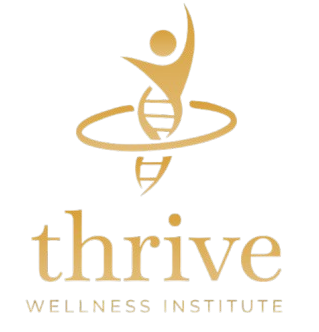Thrive Wellness Institute | Optimizing Performance from the Inside Out
Heart Rate Variability (HRV) is one of the most powerful—and often overlooked—biomarkers in modern health optimization. Whether you’re an athlete, entrepreneur, or simply trying to feel and function at your best, HRV offers real-time insights into your body’s resilience, recovery, and longevity.
At Thrive Wellness Institute, we use HRV to help our patients decode stress, personalize recovery strategies, and track improvements from hormone therapy, peptide protocols, sleep optimization, and more.
🔍 What Is HRV?
Heart Rate Variability (HRV) measures the variation in time between your heartbeats. Unlike your heart rate (how many times your heart beats per minute), HRV looks at how much that rhythm fluctuates.
This fluctuation is controlled by your autonomic nervous system (ANS)—which includes the sympathetic (“fight or flight”) and parasympathetic (“rest and repair”) branches.
A higher HRV generally indicates:
- Greater adaptability to stress
- Better cardiovascular health
- Improved recovery and performance
- Reduced inflammation
- Enhanced longevity potential
📊 Understanding Your HRV Score
Your HRV is measured in milliseconds (ms) and is highly individual—so the best use is tracking your own trends over time rather than comparing to others.
General HRV Ranges for Adults
Note: These are averages; elite athletes may score higher, and optimal ranges vary by age, gender, and lifestyle.
| HRV Score (ms) | Interpretation |
| <20 ms | Low HRV – Your body may be under high stress, poorly recovered, or dealing with inflammation or illness. Focus on rest, sleep, stress reduction, and recovery. |
| 20–50 ms | Below Average to Average – Some stress adaptation, but room for improvement. Support recovery, optimize nutrition, and manage workload. |
| 50–80 ms | Good – Balanced nervous system, healthy recovery. Keep stress in check and maintain recovery habits. |
| 80+ ms | Excellent – High resilience and recovery capacity. Continue current lifestyle, monitor for drops in HRV. |
📊 How to Use Your HRV Score
1. Baseline & Trend First
- Track daily for 2–4 weeks to establish your personal baseline.
- Look for directional shifts: drops may precede fatigue, illness, or burnout; sustained rises usually follow recovery, improved sleep, or protocol changes.
2. Contextualize the Score
- A low HRV day after a hard workout can be normal; a persistently low score over a week suggests accumulating stress.
- Pair with subjective metrics: sleep quality, mood, energy, appetite, and performance.
3. Decision Framework (Example)
- HRV drops >10% from baseline for 3+ days → downregulate intensity (e.g., light movement, prioritize sleep, reduce stimulants)
- HRV improving or stable high → proceed with planned training, therapy, or stress exposure
- Chronic low HRV despite “doing everything right” → deeper evaluation (hormones, inflammation, hidden infection, adrenal dysfunction)
🧠 Why HRV Matters
HRV gives a real-time window into:
- Your nervous system balance
- How well your body is recovering from training, illness, or daily stress
- The effectiveness of your sleep, nutrition, and therapeutic protocols
At Thrive, we monitor HRV to personalize:
- Hormone optimization (e.g., TRT, thyroid, estrogen/progesterone balance)
- Peptide therapies (like BPC-157, SS-31, and CJC/Ipamorelin)
- Sleep enhancement programs
- Stress reduction and neurocognitive support
📉 What Causes Low HRV?
Low HRV can indicate that your body is under chronic stress or struggling to recover. Common causes include:
- Poor sleep or circadian misalignment
- Overtraining or inadequate recovery
- Inflammation or illness
- High caffeine or alcohol intake
- Hormonal imbalances (low testosterone, high cortisol, low thyroid)
- Mental or emotional stress
📈 Benefits of Optimizing HRV
By improving your HRV, you support:
✅ Deeper sleep and faster recovery
✅ Enhanced mental clarity and emotional resilience
✅ Improved athletic and cognitive performance
✅ Better immune function and inflammation control
✅ Lower risk of chronic diseases (heart disease, diabetes, depression)
✅ Longer healthspan and cellular resilience
🔧 How to Improve Your HRV
At Thrive, we take a data-driven, personalized approach to HRV optimization. Here are science-backed ways to support higher HRV:
1. Sleep Deep & Consistently
- Prioritize 7–9 hours of quality sleep
- Optimize your sleep environment: dark, cool, quiet
- Use tools like the Oura Ring or Whoop to track HRV trends
2. Breathe to Balance
- Daily breathwork (4-7-8, box breathing, resonance breathing)
- Vagus nerve stimulation through slow, nasal breathing
3. Cold & Heat Therapy
- Contrast showers, sauna sessions, or cold plunges improve nervous system tone and recovery
4. Exercise, But Don’t Overtrain
- Use HRV to time your high-intensity workouts
- Include recovery days and low-intensity movement (yoga, walking)
5. Nutrient & Hormone Optimization
- Low testosterone, high cortisol, or thyroid imbalances suppress HRV
- Support with hormone therapy, peptides, and essential nutrients (magnesium, omega-3s, adaptogens)
6. Peptide & Longevity Therapies
- Peptides like BPC-157, SS-31, and Semax support autonomic balance, inflammation control, and neuroregeneration
- NAD+, GHK-Cu, and thymic peptides may also boost cellular resilience
7. Mindfulness & Recovery Tools
- Meditation, journaling, and gratitude practices reduce sympathetic dominance
- Tech like HeartMath or Apollo Neuro can train your nervous system in real time
🧬 Track It. Personalize It. Thrive.
At Thrive Wellness Institute, we help you go beyond the basics. HRV is more than a number—it’s a window into how your entire body and brain are functioning.
We’ll help you:
- Track your HRV baseline and response to therapies
- Identify hidden stressors or imbalances
- Create a customized protocol to optimize your nervous system, recovery, and resilience
📅 Ready to Thrive?
Book a consult with our team and find out how HRV tracking, hormone optimization, and recovery therapy can help you feel better, perform better, and live longer.
👉 Call us or visit Contact Us to schedule your optimization assessment today.

